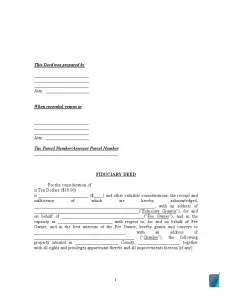Fiduciary Deed Form
A fiduciary deed is a type of legal documents used for real estate property rights transfer. We describe its main properties, how to fill it, when to use it, and risks applied to consider.

Build Your Document
Answer a few simple questions to make your document in minutes
Save and Print
Save progress and finish on any device, download and print anytime
Sign and Use
Your valid, lawyer-approved document is ready
What Is a Fiduciary Deed?
With a fiduciary deed, a property can be legally conveyed to a new owner. But contrary to all other deeds, this form is not signed by the current owner of the property. A trusted representative of the owner signs it on his/her behalf.
Fiduciary vs. Quitclaim Deed
Neither fiduciary nor quitclaim deed gives guarantees against possible encumbrances.
When a property owner signs a quitclaim deed, he or she transfers the rights to the property they might have. A trusted representative of the owner signs a fiduciary deed and transfers the rights the owner might have.
Suppose the owner of a house wants to transfer her summer house to her grandson. She issues a quitclaim deed on behalf of him. If she forgets to pay last year’s property tax, her grandson, as a new owner, will be asked to pay the debt.
Suppose the grandmother is in a coma in a hospital after surgery and cannot sign anything herself, but she has appointed her daughter as her trustee in advance. The daughter can transfer the house to her son with a fiduciary deed if she believes that she acts in her mother’s best interests. Still, if the grandmother forgets to pay the property tax, the grandson will be held liable.
When to Use a Fiduciary Deed
There are situations when the owner of a property does not sign property-related documents himself/herself:
- The owner is dead, and the property is in the hands of an executor.
- The owner has appointed a trustee.
- The owner is a minor.
- A trust manages the property.
In all these cases, a fiduciary can sign a deed on behalf of the owner if he or she believes the transfer of real estate is in the owner’s best interests.
What Are the Limitations of a Fiduciary Deed?
This type of property conveyance is not the best option for a beneficiary to the deed since it does not give any guarantees against possible encumbrances. There is an additional risk that the trusted person’s authority or intentions could be challenged in a court, causing disruption to the deed.
In the above example, the grandmother, if she recovers from her illness, or another family member can claim that it was never her intention to convey the house to the grandson and the trustee was well aware of it.

What Should Be Included in a Fiduciary Deed?
The forms of legal deeds vary from state to state, and the correct form for each one can be easily found online.
The typical fields are:
- The name of the fiduciary, i.e., the one who signs the deed on behalf of the owner and a note that he or she is authorized to do so;
- The name of the beneficiary to the deed, the grantee;
- The legal description of the property (It is crucial to fill in the correct parcel number to avoid any misunderstanding.);
- The amount of money that was paid for the property. (Usually, a property is transferred free of charge with a fiduciary deed. The consideration still has to be mentioned in a document. Under such circumstances, commonly, it equals a symbolic $10.);
- The witnesses’ signatures (They are required in some states.);
- Typically, a fiduciary deed is verified and signed by a notary public.
Frequently Asked Questions
Who is a fiduciary?
A fiduciary is a person who signs a deed on behalf of the owner of some asset. A fiduciary can act on behalf of a diseased person as an executive of their will. It could be an appointed trustee of a particular person. A guardian of a minor can sign a deed on his or her behalf too.
Is using a fiduciary deed secure?
A fiduciary deed legitimately conveys property, but it does not protect a new owner from legal and financial risks. Additionally, a fiduciary’s intentions and authority can be challenged, but it is the fiduciary who carries the risks of violation of the owner’s will.
Suppose the granddaughter in the above example files a complaint about transferring the summer house against her grandmother’s will, and the court agrees with the granddaughter. The fiduciary will be held responsible, not the beneficiary to the deed.
What is the difference between a fiduciary deed and a last will?
A last will is a legal document in which a person states how his/her property has to be distributed upon his/her death and appoints an executor of the will. After the person’s death, the property goes through probate. During probate, the validity of the will is studied by the court. When it is determined, the executor transfers the property of the deceased person to his/her heirs with a fiduciary deed.
Suppose the grandmother died in the hospital. In her will, she asked to give the summer house to her grandson and distribute her other property between her daughter and her granddaughter. She appointed the granddaughter as her executive. The granddaughter will be managing the property during the period of probate. And when it is over, she will transfer the property to her mother, brother, and herself with fiduciary deeds.